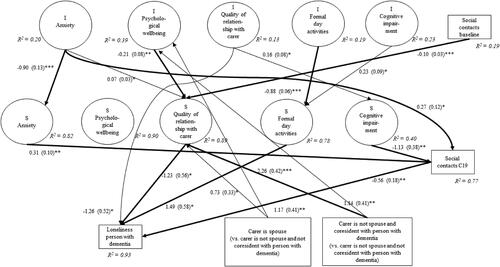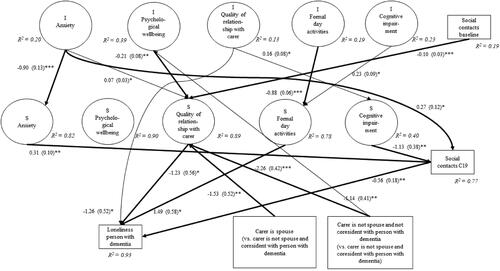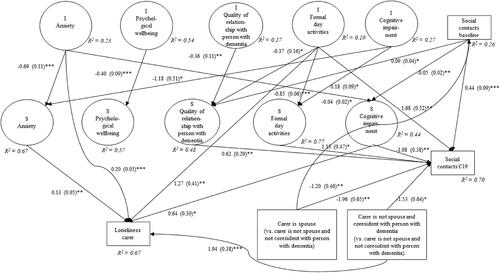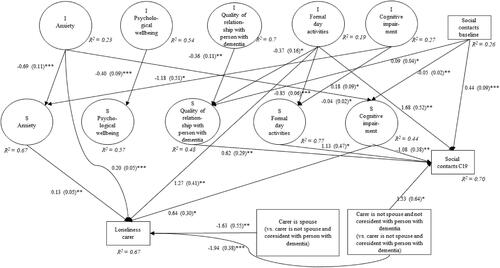Figures & data
Table 1. Background variables in carers and people with dementia at baseline and among those who participated in D-C19 study.
Table 2. Social resources, wellbeing, and clinical dementia rating at baseline and D-C19 study, and loneliness (D-C19 study only).
Table 3. Direct and indirect effects in the models for carers and people with dementia (the indirect paths shown in and ).
Figure 1. People with dementia model: The change (S = slope) and initial level (I = Intercept) of anxiety (ONS), psychological wellbeing (ONS), quality of relationship with carer, formal day activities, and cognitive impairment (CDR) between baseline and C19 study in DETERMIND (n = 206) and further on people with dementia loneliness in D-C19 study using Latent Growth Curve and observed social contacts. Only significant paths shown for the full model. Unstandardized path estimates and standard errors in parenthesis shown. Adjusted for background variables. *p < 0.05, **p < 0.01, *** p < 0.001. Model fit: Chi-square = 99.25, degrees of freedom = 49, CFI = 0.91, RMSEA = 0.047, SRMR = 0.041. Thicker lines for the paths indicate a significant indirect effect.

Figure 2. People with dementia model: The change (S = slope) and initial level (I = Intercept) of anxiety (ONS), psychological wellbeing (ONS), quality of relationship with carer, formal day activities and cognitive impairment (CDR) between baseline and C19 study in DETERMIND (n = 206) and further on people with dementia loneliness in D-C19 study using Latent Growth Curve and observed social contacts. Only significant paths shown for the full model. Unstandardized path estimates and standard errors in parenthesis shown. Adjusted for background variables. *p < 0.05, **p < 0.01, ***p < 0.001. Model fit: Chi-square = 99.25, degrees of freedom = 49, CFI = 0.91, RMSEA = 0.047, SRMR = 0.041. Thicker lines for the paths indicate a significant indirect effect.

Figure 3. Carer model: The change (S = slope) and initial level (I = Intercept) of anxiety (ONS), psychological wellbeing (ONS), quality of relationship with person with dementia, formal day activities and cognitive impairment (CDR) between baseline and C19 study in DETERMIND (n = 206) and further on carer loneliness in D-C19 study using Latent Growth Curve and observed social contacts. Only significant paths shown for the full model. Unstandardized path estimates and standard errors in parenthesis shown. Adjusted for background variables. *p < 0.05, **p < 0.01, ***p < 0.001. Model fit: Chi-square = 107.54, degrees of freedom = 49, CFI = 0.91, RMSEA = 0.016, SRMR = 0.030.

Figure 4. Carer model: The change (S = slope) and initial level (I = Intercept) of anxiety (ONS), psychological wellbeing (ONS), quality of relationship with person with dementia, formal day activities and cognitive impairment (CDR) between baseline and C19 interview in DETERMIND (n = 206) and further on carer loneliness in D-D-C19 study using Latent Growth Curve and observed social contacts. Only significant paths shown for the full model. Unstandardized path estimates and standard errors in parenthesis shown. Adjusted for background variables. *p < 0.05, **p < 0.01, ***p < 0.001. Model fit: Chi-square = 107.54, degrees of freedom = 49, CFI = 0.91, RMSEA = 0.016, SRMR = 0.030.

Supplemental Material
Download MS Word (67 KB)Data availability statement
Deidentified participant data will be available with investigator support from 9 months after publication of the last DETERMIND-C19 paper via [email protected] for researchers whose proposed use of the data has been approved by the DETERMIND Programme Management Board. The study protocol will be available as a supporting document.
